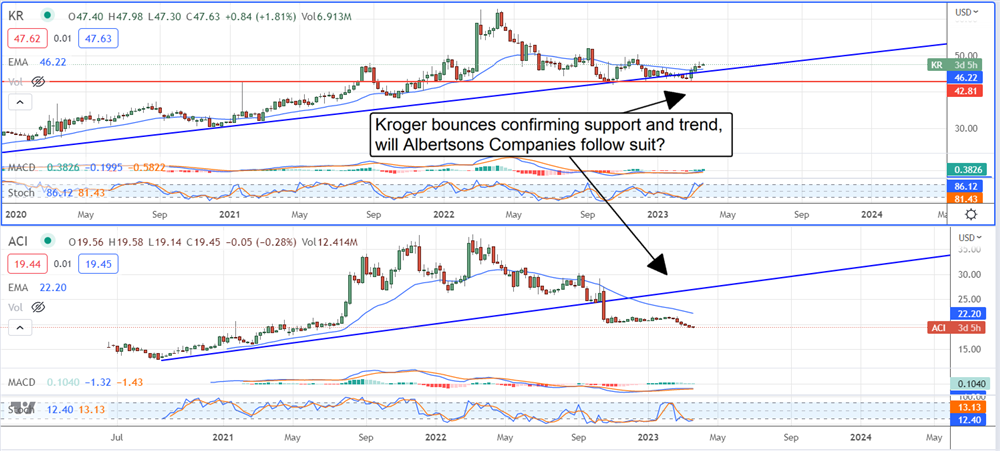When Kroger NYSE: KR and Albertsons Companies NYSE: ACI announced their merger, it took the grocery market by storm. The merger aligns two brands to create a national footprint capable of competing with dominant food retailers like Walmart NYSE: WMT. The merger, after considerations, is estimated to be worth $28 per share for Albertsons’ investors should the deal go through, but there are risks.
Lawsuits stemming from labor unions, small grocery chains, and consumer advocates have the deal on hold, which has opened up other opportunities in both stocks on top of the already attractive 42% discount that ACI shares offer.
Analysts Think Albertsons Is A Value
The merger issues have Albertsons' shares moving lower than Kroger, which recently confirmed its uptrend. The stock trades at a paltry 6X its earnings while paying a healthy 2.5% dividend which is a value for investors but more so due to Kroger’s higher 10X valuation. The analysts view the stock as a Hold verging on Buy and call out this value despite the uncertainty of the merger.
The most recent update comes from Morgan Stanley, which rates the stock a Hold but says it is undervalued and suffering for no good reason. In their view, the company offers a compelling opportunity as a stand-alone business without the merger, so it should trade at least 12.5% above the current level, if not near the $28 merger target price.
“The fundamental and market backdrops for ACI have not deteriorated over the past month. If anything, the read through from KR's Q4'22 earnings should have been neutral, if not positive for ACI in terms of current Food at Home trends as well as sales and margin retention in '23,” said equity analysis Simeon Gutman in a note to clients. “The market backdrop, which has gotten more volatile/turbulent in the past couple weeks, should also be a positive for defensive, durable Food Retail stocks like ACI. This is why we lean toward technical/sentiment factors as the primary reason for ACI's underperformance.”
Kroger: Focus On The Value
The analyst activity in Kroger has been mixed since it reported a mixed Q4 report. The takeaway from the report is that revenue was weaker than expected due to a slowing in discretionary items, but the margin was better than expected and left the bottom line well above the Marketbeat.com consensus estimate. The takeaway from the analysts' activity is that sentiment is firming and verging on a weak Buy after a year in Hold territory. The price target is holding steady and even edged lower in the last month but still offers at least a 12.5% upside on top of the 2.2% dividend yield.
North Coast Research analysts Charles Cerankosky upped Kroger to Buy from Hold, telling clients to focus on Kroger’s value for its merits and worry about the merger later. In his view, the company is well-positioned with consumers and has a loyal following to support the business. His price target is $60 or 12% above the Marketbeat.com consensus.
The Charts: Kroger Bounces, Will Albertsons Follow?
The charts of these stocks are nearly identical, with 1 glaring difference. Kroger has bounced from a bottom to confirm support and trend, while Albertsons is still drifting lower. The setup and market sentiment suggest that Albertsons could rebound soon; the question is when? Assuming Albertsons’ investors start buying again, this stock could quickly rebound 12.5% to regain the trend, and if the company continues on its own, a move to $60 isn’t hard to imagine.

Before you consider Kroger, you'll want to hear this.
MarketBeat keeps track of Wall Street's top-rated and best performing research analysts and the stocks they recommend to their clients on a daily basis. MarketBeat has identified the five stocks that top analysts are quietly whispering to their clients to buy now before the broader market catches on... and Kroger wasn't on the list.
While Kroger currently has a Moderate Buy rating among analysts, top-rated analysts believe these five stocks are better buys.
View The Five Stocks Here
Discover the top 7 AI stocks to invest in right now. This exclusive report highlights the companies leading the AI revolution and shaping the future of technology in 2025.
Get This Free Report
Like this article? Share it with a colleague.
Link copied to clipboard.